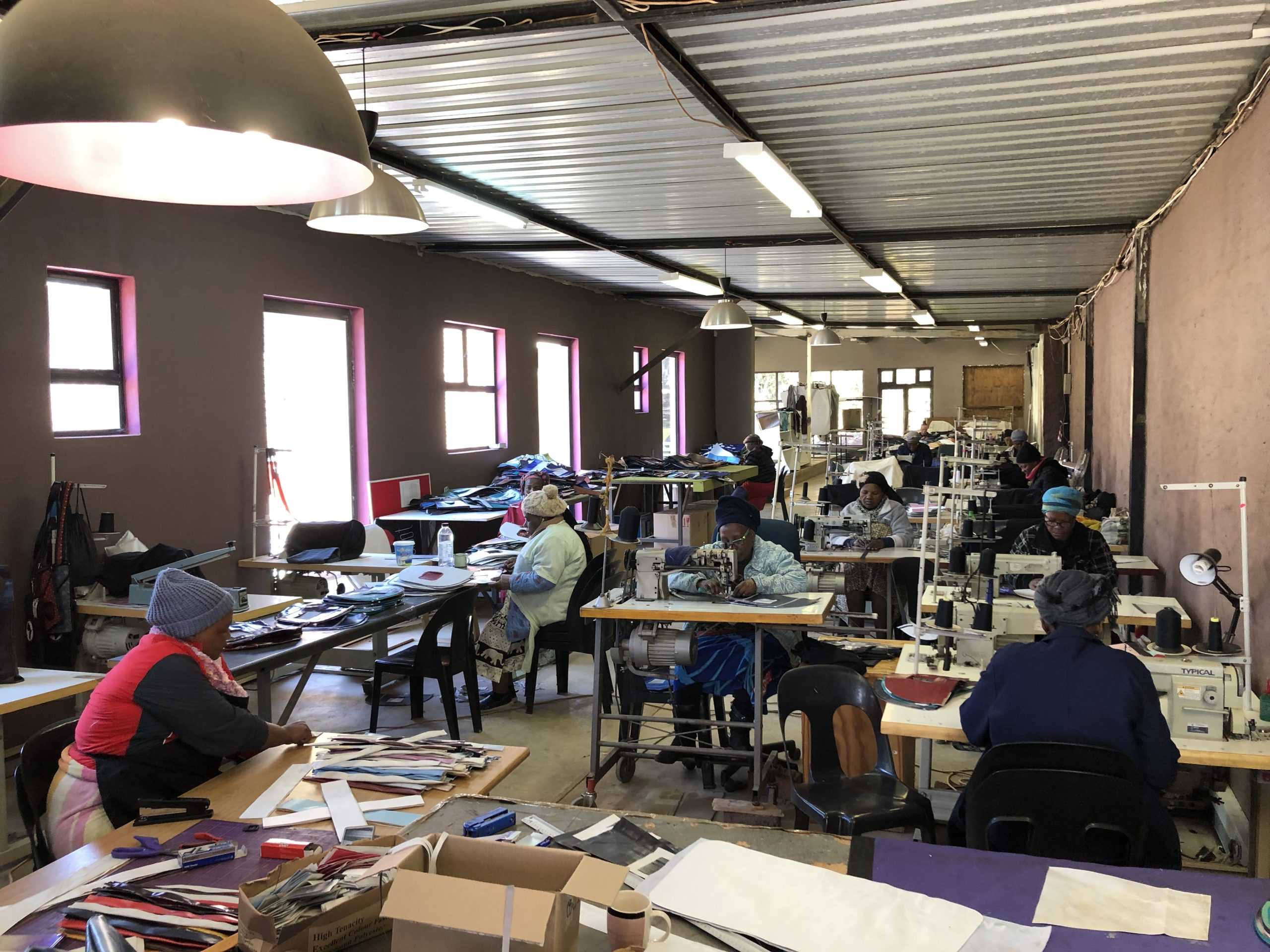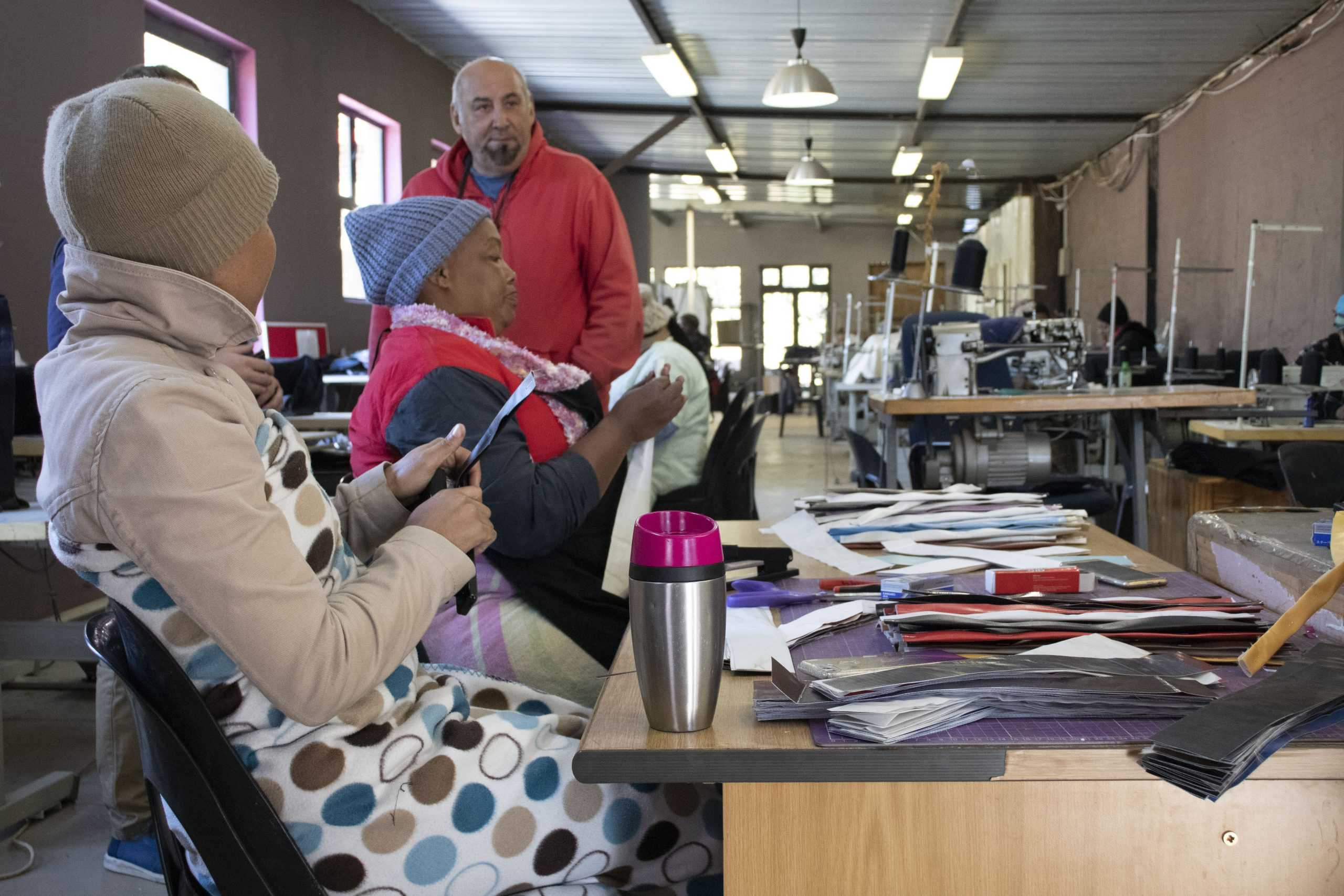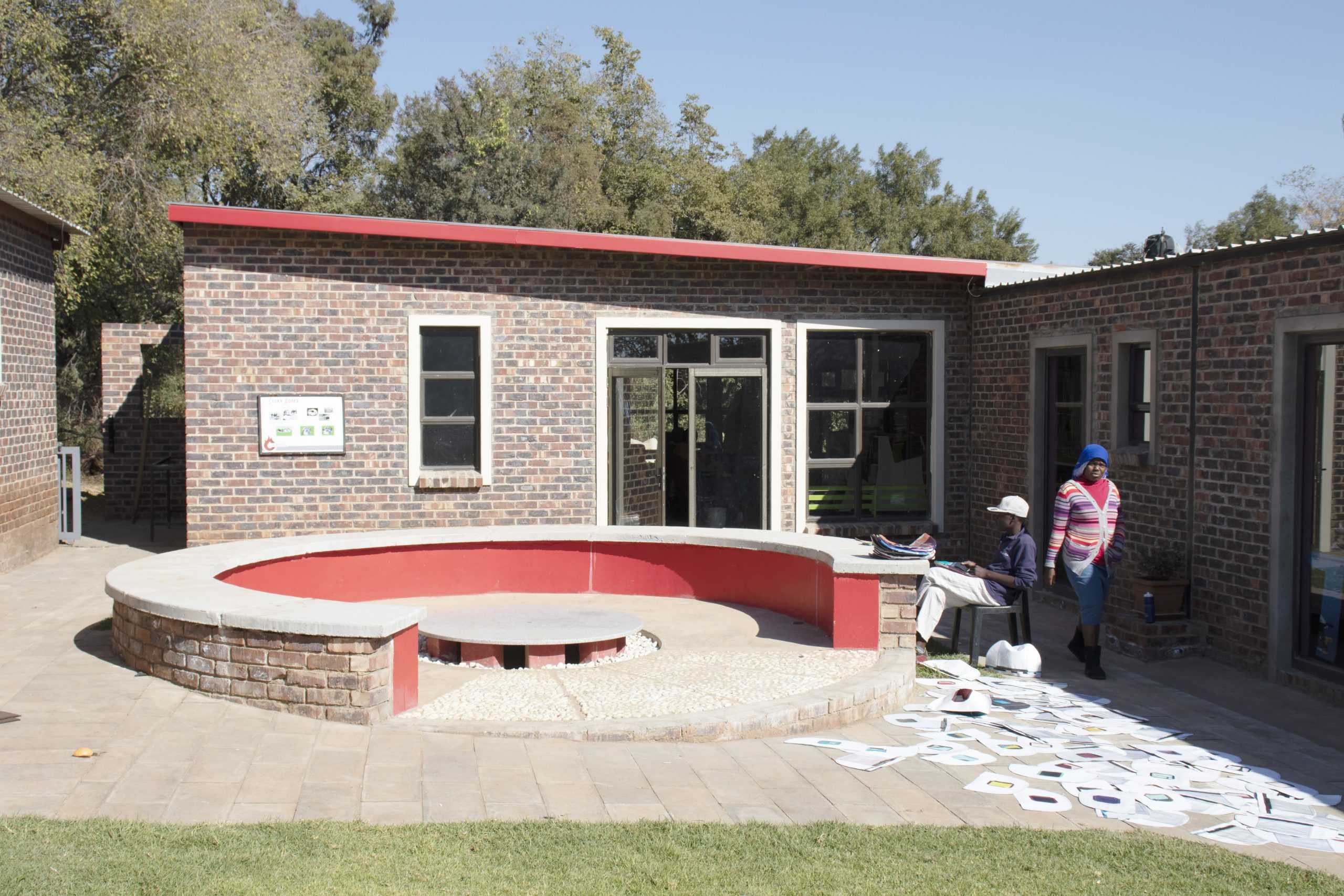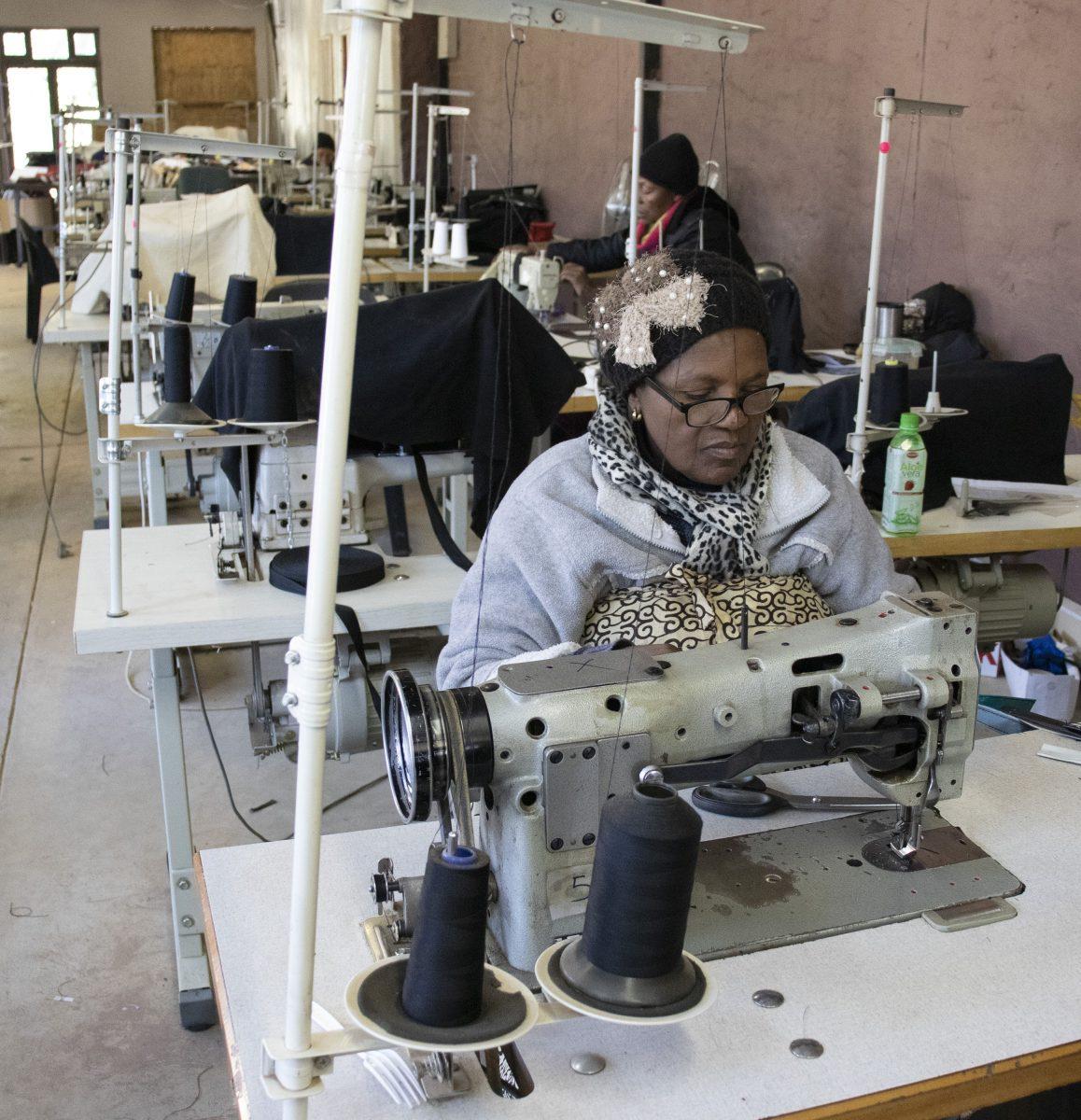Diepsloot, South Africa — On the site of what was formerly a wood chipping plant about six miles north of the township of Diepsloot, a sprawling array of one-story brick buildings and shipping containers now house a special education center and an upcycling bag and apparel factory.
The factory workers are women primarily from Diepsloot, which was created in 1995 as an informal settlement for black residents who were relocated from another informal settlement. At sewing machines and tables piled with squares of plastic material, they use the skills they are taught to turn that plastic into about 75 bags per day.
The goal is for them to earn money to support themselves and their families but also to acquire skills they can use throughout their lives.

One of the workers, Nicia Pretorius, recently returned to the factory after being in and out of hospitals and psychiatric institutions to help treat her schizophrenia. Pretorius is not from Diepsloot, but she is pregnant with a child she plans to give up for adoption. She said working at the factory has helped her persevere through these trials.
“I love being here,” said Pretorius, as she sat at the back of the factory removing staples from PVC strips. “I really enjoy the people. It does [help me cope] because it keeps my mind stimulated and keeps me active.”
The women make handbags, messenger bags, sling bags and other items primarily from used billboards made out of PVC and plastic. One of their products is a school bag with a solar light that allows children in rural areas to study after the sun sets. The company they work for, I Love Diepsloot, is part of Jacobs Well, a Charismatic Pentecostal Christian non-government organization (NGO), using its factory profits to fund special education and give the women a sustainable income.
Jacobs Well was founded by Pierre Du Toit who purchased the property in 2008. Du Toit and his wife, Anke Du Toit, now live and manage the Jacobs Well factory and special education center as well as a high school, a preschool and a learning center in the city of Benoni, about 20 miles east of Johannesburg, and Centurion, an area in the Tshwane municipality north of Johannesburg.
Nicolaos Theofrastos, a clothing designer who said he was plucked by Du Toit from his own despair and troubles, took over as factory manager in 2012 as it was trending toward bankruptcy.

The company currently employs two men and 20 women, whom Theofrastos calls his “ladies.” The workers are bussed to the factory each day, mainly from Diepsloot. Diepsloot’s unemployment rate is among the highest in the Gauteng province, with between 4,965 and 8,758 unemployed people per square kilometer.
Valerie Worth, a former environmental scientist who now manages, works and lives on the property, is helping to turn it into a place of solace.
“This is a place of healing,” Worth said. “It is a place of fantastic restoration for people. We’re not here as rescuers, but that we’ve all been rescued. Life is tough out there, really, really tough, and everyone has fallen at some stage.”
Both Theofrastos and Du Toit emphasized the influence of their own troubled pasts in finding emotional refuge at Jacobs Well. Theofrastos suffers from bipolar disorder and was institutionalized for eight year prior to taking over I Love Diepsloot. Du Toit is a survivor of child abuse. He is HIV positive and two of his partners died before he devoted himself to the mission of Jacobs Well.
“We all have a history, we all have a past, we very much are our wounds, and as we go through life we have to manage to deal with them and then become whole in the process,” Du Toit said.
Theofrastos said his past also turned him to a life of helping others.
“I was locked up,” Theofrastos said. “I was told I would never work in my life again. I lost everything. My whole life just crumbled around me. But then I asked myself, why turn this into a negative? [I Love Diepsloot] is more than my life back. It’s everything. We’ve all got stories, we’ve all got stepping stones. Those stepping stones are what you make of them. You can use them to help people.”
The people who work in the I Love Diesploot factory have stories as well.
There’s Anna Thatoeng Motselco, whose tenure at I Love Diepsloot dates back to before Theofrastos began managing the factory.
When Theofrastos took over the factory, Motselco found him visibly uncomfortable and antisocial, isolating himself from the women, likely because of his bipolar disorder.
“One day I talked to him and said, ‘You musn’t be scared’,” Mostelco said. “From then, he became friendly to us, and we started to welcome him. We did everything with him, and he was able to talk to us, so we were able to also learn from him.”
Theofrastos said he wouldn’t be here today without that conversation.
“She pulled me out of myself, and all the ladies then welcomed me,” Theofrastos said.
Jacobs Well returned the favor to Mostelco, who has a history of blindness in her family. Jacobs Well gaver her 85,000 rands ($5,748.34 USD) to cover medical costs to help her avoid that fate, according to Du Toit.
Some of the women who work at the factory leave after learning skills they can use to find higher paying jobs or start businesses in their own community.

Du Toit said the coming and going of factory workers falls in line with the goal of the organization.
“It all revolves around empowering people with skill sets,” Du Toit said. “A lot of people that were in the factory aren’t there any more because they’ve got a job for double the income. We’re not a pond. We’re a river. Ponds become stagnant.”
The special education center which is on the Jacobs Well property directly benefits from the money I Love Diepsloot brings in. The center currently serves 40 children from Diepsloot with autism spectrum disorder, cerebral palsy, hydrocephalus and other physical and learning challenges. They are bussed to and from the center each morning.
Whether it is through profits that fund special education, or by teaching the women in the factory skills they can apply, I Love Diepsloot has become a driving force behind Jacobs Well’s mission of restoring the future.
“[Education] is our main priority,” Worth said. “This is what the original vision at the start of the project was. It is all underpinned by education. If we don’t improve the education, which is a crisis in this country, we are not going to change the economy of the country.”
Du Toit echoed that need to focus on education, which is entwined with the mission of the upcycling factory.
“To reclaim the future means that you take something that doesn’t exist, like the broken education system, and we bring it into the now,” Du Toit said. “When you talk about upcycling, we also want to start changing education and repurposing it and making sure that those individuals go out and become whole people.”
Cara Smith ’21 contributed to this story.










































